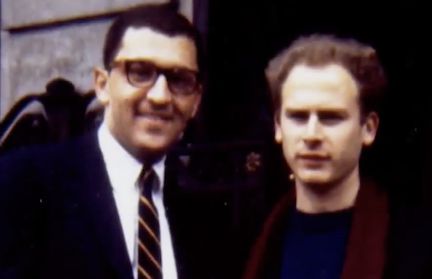The Gift of the Moleskin Pants
According to Snopes, the hillarious urban legend of brothers who regifted each other the same pair of moleskin pants for over 25 years isn't just a legend. It's actually TRUE!
"For twenty-five years, two brothers-in-law traded the same pants back and forth between them as a Christmas gift, each time finding more inventive ways to wrap them."
It all began in 1964 when Larry Kunkel's mom gave him a pair of moleskin pants. After wearing them a few times, he found they froze stiff in Minnesota winters and thus wouldn't do. That next Christmas, he wrapped the garment in pretty paper and presented it to his brother-in-law.
Brother-in-law Roy Collette discovered he didn't want them either. He bided his time until the Christmas after, then packaged them up and gave them back to Kunkel. This yearly exchange proceeded amicably until one year Collette twisted the pants tightly and stuffed them into a 3-foot-long, 1-inch wide pipe.

This game of regifting went on and on, year after year, with each of the men getting increasingly more creative. One year Collette stuffed the pants into a 3-foot-long, 1-inch wide pipe. Kunkel compressed the pants into a 7-inch square, wrapped them with wire and gave the "bale" to Collette. Then Collette stuffed the pants into a 2-foot-square crate which he then "filled with stones, nailed it shut, banded it with steel and gave the trusty trousers back to Kunkel."
Kunkel next had the pants mounted inside an insulated window that had a 20-year guarantee and shipped them off to Collette.
Collette broke the glass, recovered the trousers, stuffed them into a 5-inch coffee can, which he soldered shut. The can was put in a 5-gallon container filled with concrete and reinforcing rods and given to Kunkel the following Christmas.
Kunkel installed the pants in a 225-pound homemade steel ashtray made from 8-inch steel casings and etched Collette's name on the side. Collette had trouble retrieving the treasured trousers, but succeeded without burning them with a cutting torch.
Collette found a 600-pound safe and hauled it to Viracon Inc. in Owatonna, where the shipping department decorated it with red and green stripes, put the pants inside and welded the safe shut. The safe was then shipped to Kunkel ...
Other "gift wrap" over the years inclouded a encasing the pants in a 250 steel ashtray, welcding them inside a 600 lb safe, embedding them within a double paned window, and cementing them in a 5 gallon bucket filled with concrete and reinforced steel bars,
But wait, there's more!
The pants next turned up in a drab green, 3-foot cube that once was a 1974 Gremlin. A note attached to the 2,000-pound scrunched car advised Collette that the pants were inside the glove compartment.
In 1982 Kunkel faced the problem of retrieving the pants from a tire 8 feet high and 2 feet wide and filled with 6,000 pounds of concrete. On the outside Collette had written, "Have a Goodyear."
In 1983 the pants came back to Collette in a 17.5-foot red rocket ship filled with concrete and weighing 6 tons. Five feet in diameter, with pipes 6 inches in diameter outside running the length of the ship and a launching pad attached to its bottom, the rocket sported a picture of the pants fluttering atop it. Inside the rocket were 15 concrete-filled canisters, one of which housed the pants.
Collette's revenge for the rocket ship was delivered to Kunkel in the form of a 4-ton Rubik's Cube in 1985. The cube was made of concrete that had been baked in a kiln and covered with 2,000 board feet of lumber.
Kunkel "solved the cube," and for 1986 gift-giving repackaged the pants into a station wagon filled with 170 steel generators all welded together.
Not to be outdone, Collette took the gift wrapping just a tad too far. "Sadly, 1989's packaging scheme brought the demise of the much-abused garment."
Collette was inspired to encase the pantaloons in 10,000 pounds of jagged glass that he would then deposit in Kunkel's front yard. "It would have been a great one — really messy," Kunkel ruefully admitted. The pants were shipped to a friend in Tennessee who managed a glass manufacturing company. While molten glass was being poured over the insulated container that held them, an oversized chunk fractured, transforming the pants into a pile of ashes.
The ashes were deposited into a brass urn and delivered to Kunkel along with this epitaph: "Sorry, Old Man Here lies the Pants ... An attempt to cast the pants in glass brought about the demise of the pants at last."
The urn now graces the fireplace mantel in Kunkel's home.

In the birth, life, death, resurrection and Person of the Lord Jesus Christ, God gift wrapped and offered the world the greatest gift EVER given. But you won't have to crack a 600 lb safe or decompress a hydraulically compacted 1974 Gremlin to dig it out of the glove compartment.
It is the gift of eternal life -- the forgiveness of sin and the promise of the resurrection to come. All you need do is reach out and receive it. Yep, it's that simple. You don't have to wrestle, or saw, or dig, or work for it in any way. In fact, you couldn't if you wanted to. It is a FREE gift, pure and simple, no strings, metal weldings, steel bars, or concrete attached.
"For by grace you have been saved through faith, and this is not from you; it is the gift of God; it is not from works, so no one may boast" (Ephesians 2:8-9, NIV).
"Thanks be to God for his indescribable gift!" (2 Corinthians 9:15, NIV).
Who Will Save You When You're Under Too Long
At the at the 2022 World Aquatics Championships, two-time US Olympian swimmer, Anita Alvarez ,was finishing her "artistic" swimming routine in the solo freestyle final when she suddenly sank to the bottom of the pool.
Crowds stood stunned when they realized she was not surfacing in a timely way. Her team coach, Andrea Fuentes, herself an Olympic swimmer, frantically tried to get the attention of the lifeguards, but to no avail.
"I saw that the lifeguards were not jumping into the water because they were paralyzed. I was shouting at them from the other side to get into the water, now! I saw them looking dumbfounded, so I jumped into the water and straight towards her ... I saw how she was sinking and I swam as fast as I could. I did the fastest freedive of my life, faster than when I was preparing for the Olympics," Fuentes said according to El Pais.
It seems that Alvarez took in water on the last leg of her performance and passed out. Medical personnel were able to resucitate and treat her.
Because of her coach's quick action, she made a full recovery, and even returned to competition the following season.

Click here for dramatic video of the rescue.
One social media influencer tweeted this repsonse to the dramatic rescue:
"If Andrea would not have noticed, she would have drown. But she knew Anita. She looked for her, quickly noticed she was under too long, then dove in without thinking twice.
This has resonated with me. ...
When you are under too long, who are the people that will look for you, notice, and dive in to pull you to the surface when you lose your strength to swim? Who are the people that would do that for you?
And can someone count on you to be that person that would go looking and notice when they are under too long, diving in to support them when they are all out of fight and fuel to swim in these turbulent waters we call life? -- Original tweet by @TaraBull808, later shared on Facebook.
"A friend loves at all times, and a brother is born for adversity" (Proverbs 17:7, ESV).
"Carry each other’s burdens, and in this way you will fulfill the law of Christ" (Galatians 6:2, NIV).
"We know what real love is because Jesus gave up his life for us. So we also ought to give up our lives for our brothers and sisters" (1 John 3:16, NLT).
Eyes In the Darkness
Everybody knows the iconic Simon & Garfunkel song, but do you know the amazing story behind the first line of The Sounds of Silence?
It began 62 years ago, when Arthur “Art” Garfunkel, a Jewish kid from Queens, enrolled in Columbia University. During freshman orientation, Art met a student from Buffalo named Sandy Greenberg, and they immediately bonded over their shared passion for literature and music. Art and Sandy became roommates and best friends. With the idealism of youth, they promised to be there for each other no matter what.
Soon after starting college, Sandy was struck by tragedy. His vision became blurry and although doctors diagnosed it as temporary conjunctivitis, the problem grew worse. Finally after seeing a specialist, Sandy received the devastating news that severe glaucoma was destroying his optic nerves. The young man with such a bright future would soon be completely blind.
Sandy was devastated and fell into a deep depression. He gave up his dream of becoming a lawyer and moved back to Buffalo, where he worried about being a burden to his financially-struggling family. Consumed with shame and fear, Sandy cut off contact with his old friends, refusing to answer letters or return phone calls.
Then suddenly, to Sandy’s shock, his buddy Art showed up at the front door. He was not going to allow his best friend to give up on life, so he bought a ticket and flew up to Buffalo unannounced. Art convinced Sandy to give college another go, and promised that he would be right by his side to make sure he didn’t fall - literally or figuratively.
Art kept his promise, faithfully escorting Sandy around campus and effectively serving as his eyes. It was important to Art that even though Sandy had been plunged into a world of darkness, he should never feel alone. Art actually started calling himself “Darkness” to demonstrate his empathy with his friend. He’d say things like, “Darkness is going to read to you now.” Art organized his life around helping Sandy.
One day, Art was guiding Sandy through crowded Grand Central Station when he suddenly said he had to go and left his friend alone and petrified. Sandy stumbled, bumped into people, and fell, cutting a gash in his shin. After a couple of hellish hours, Sandy finally got on the right subway train. After exiting the station at 116th street, Sandy bumped into someone who quickly apologized - and Sandy immediately recognized Art’s voice! Turned out his trusty friend had followed him the whole way home, making sure he was safe and giving him the priceless gift of independence. Sandy later said, “That moment was the spark that caused me to live a completely different life, without fear, without doubt. For that I am tremendously grateful to my friend.”
Sandy graduated from Columbia and then earned graduate degrees at Harvard and Oxford. He married his high school sweetheart and became an extremely successful entrepreneur and philanthropist.
While at Oxford, Sandy got a call from Art. This time Art was the one who needed help. He’d formed a folk rock duo with his high school pal Paul Simon, and they desperately needed $400 to record their first album. Sandy and his wife Sue had literally $404 in their bank account, but without hesitation Sandy gave his old friend what he needed.
Art and Paul's first album was not a success, but one of the songs, The Sounds of Silence, became a #1 hit a year later. The opening line echoed the way Sandy always greeted Art. Simon & Garfunkel went on to become one of the most beloved musical acts in history.
The two Columbia graduates, each of whom has added so much to the world in his own way, are still best friends. Art Garfunkel said that when he became friends with Sandy, “my real life emerged. I became a better guy in my own eyes, and began to see who I was - somebody who gives to a friend.” Sandy describes himself as “the luckiest man in the world.”

Art and Paul's first album was not a success, but one of the songs, The Sounds of Silence, became a #1 hit a year later. The opening line echoed the way Sandy always greeted Art. Simon & Garfunkel went on to become one of the most beloved musical acts in history.
The two Columbia graduates, each of whom has added so much to the world in his own way, are still best friends. Art Garfunkel said that when he became friends with Sandy, “my real life emerged. I became a better guy in my own eyes, and began to see who I was - somebody who gives to a friend.” Sandy describes himself as “the luckiest man in the world.”
In a world of spiritual blindness, Jesus is our trusted friend and guide.
"Thus says the Lord, your Redeemer, the Holy One of Israel: 'I am the Lord your God, who teaches you to profit, who leads you in the way you should go'" (Isaiah 48:17, ESV).
"Trust in the LORD with all thine heart; and lean not unto thine own understanding. In all thy ways acknowledge him, and he shall direct thy paths" (Proverbs 3:5-6, ESV).